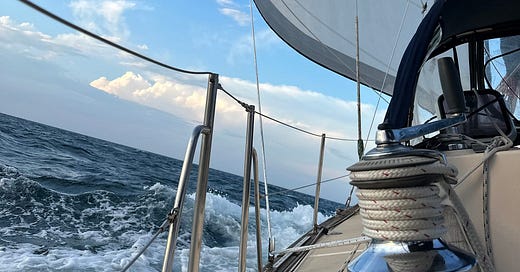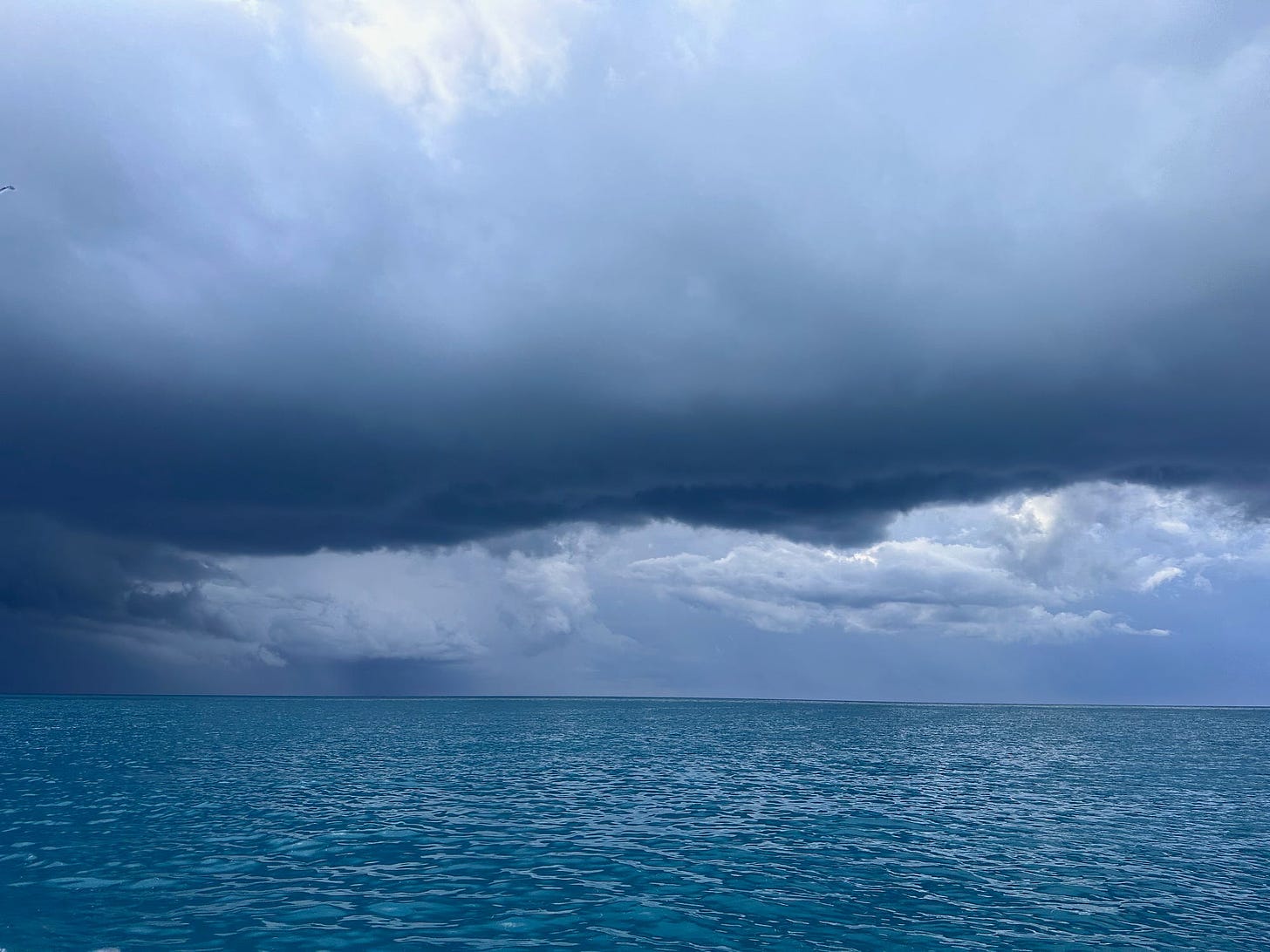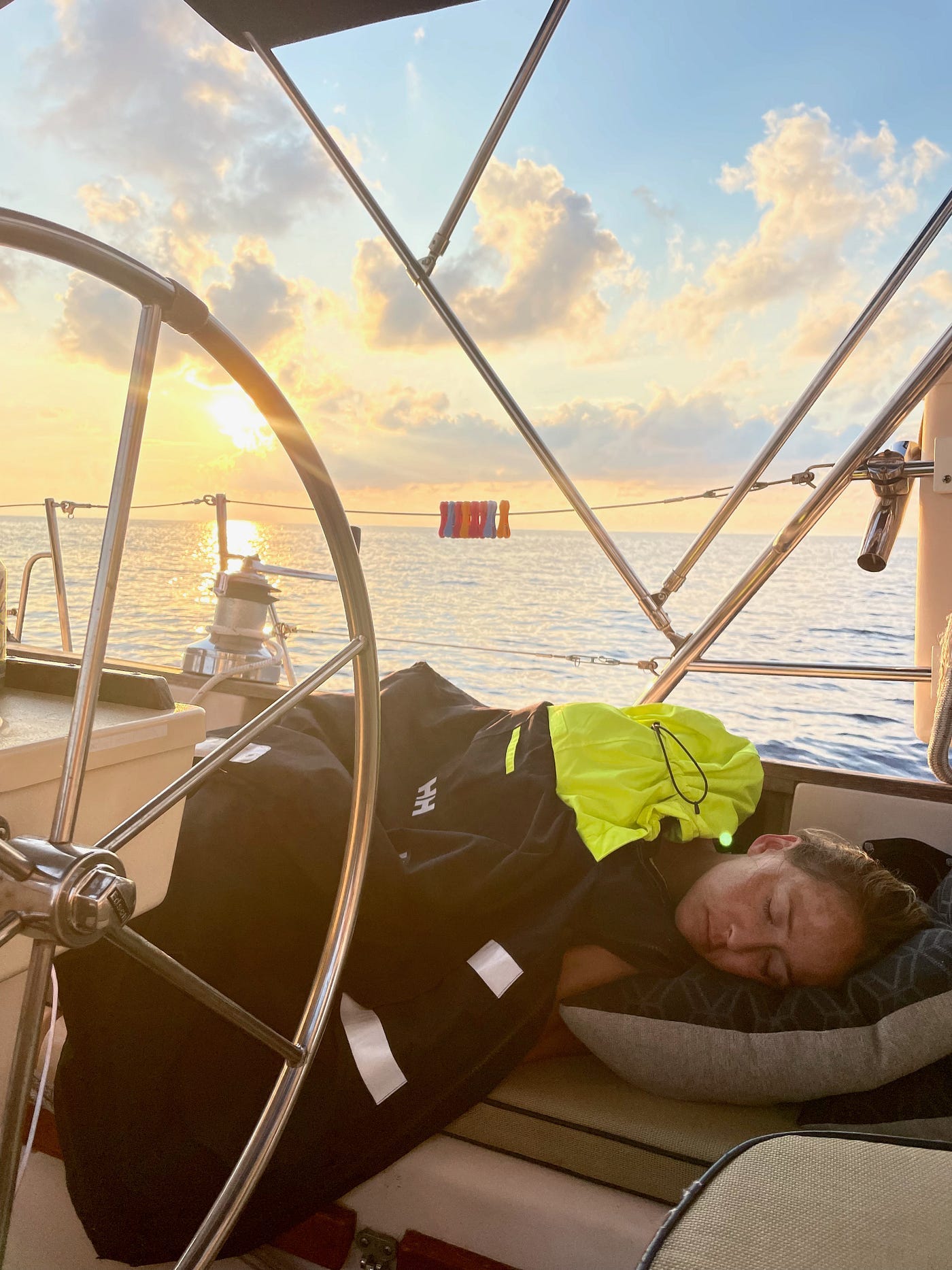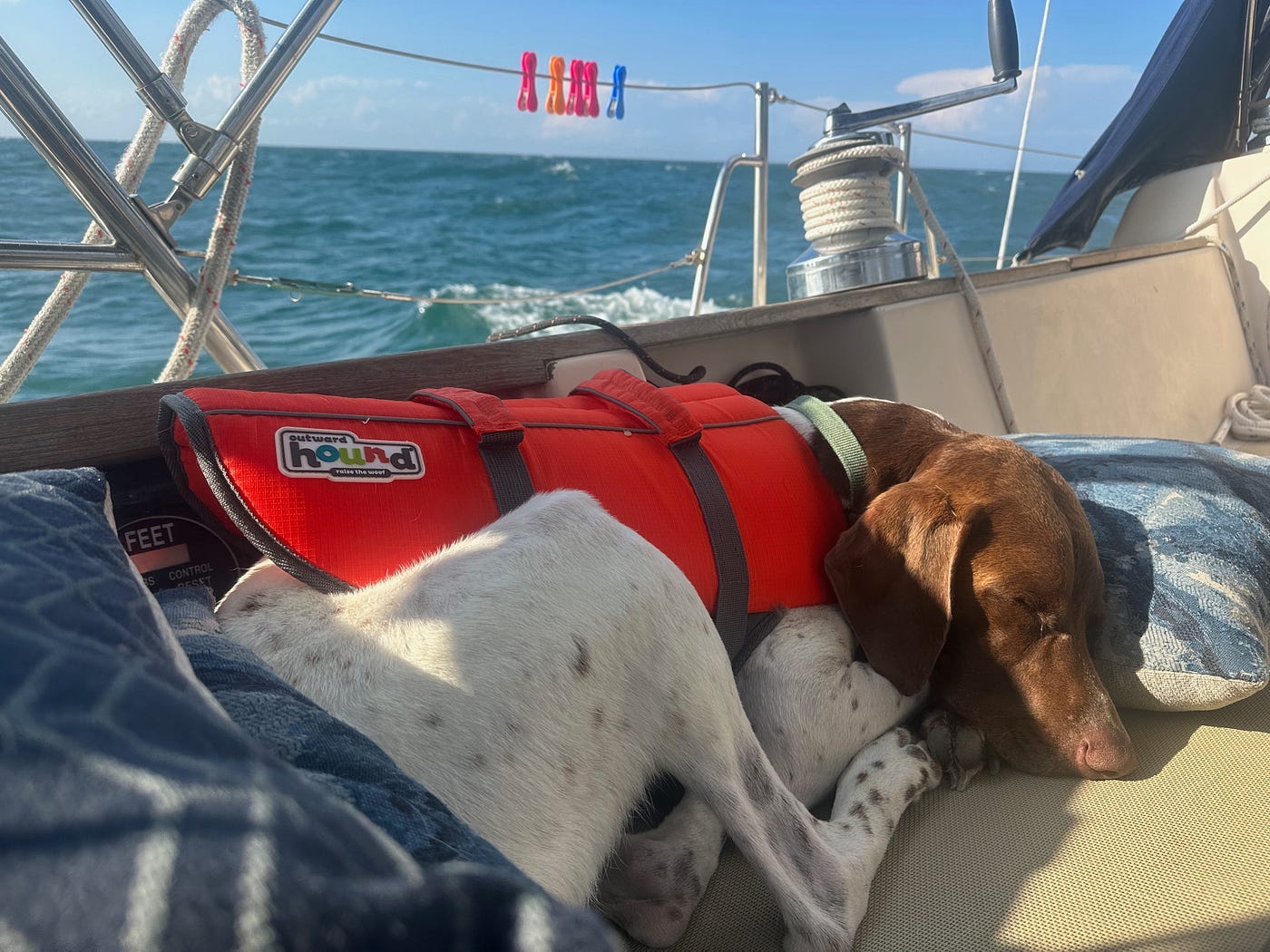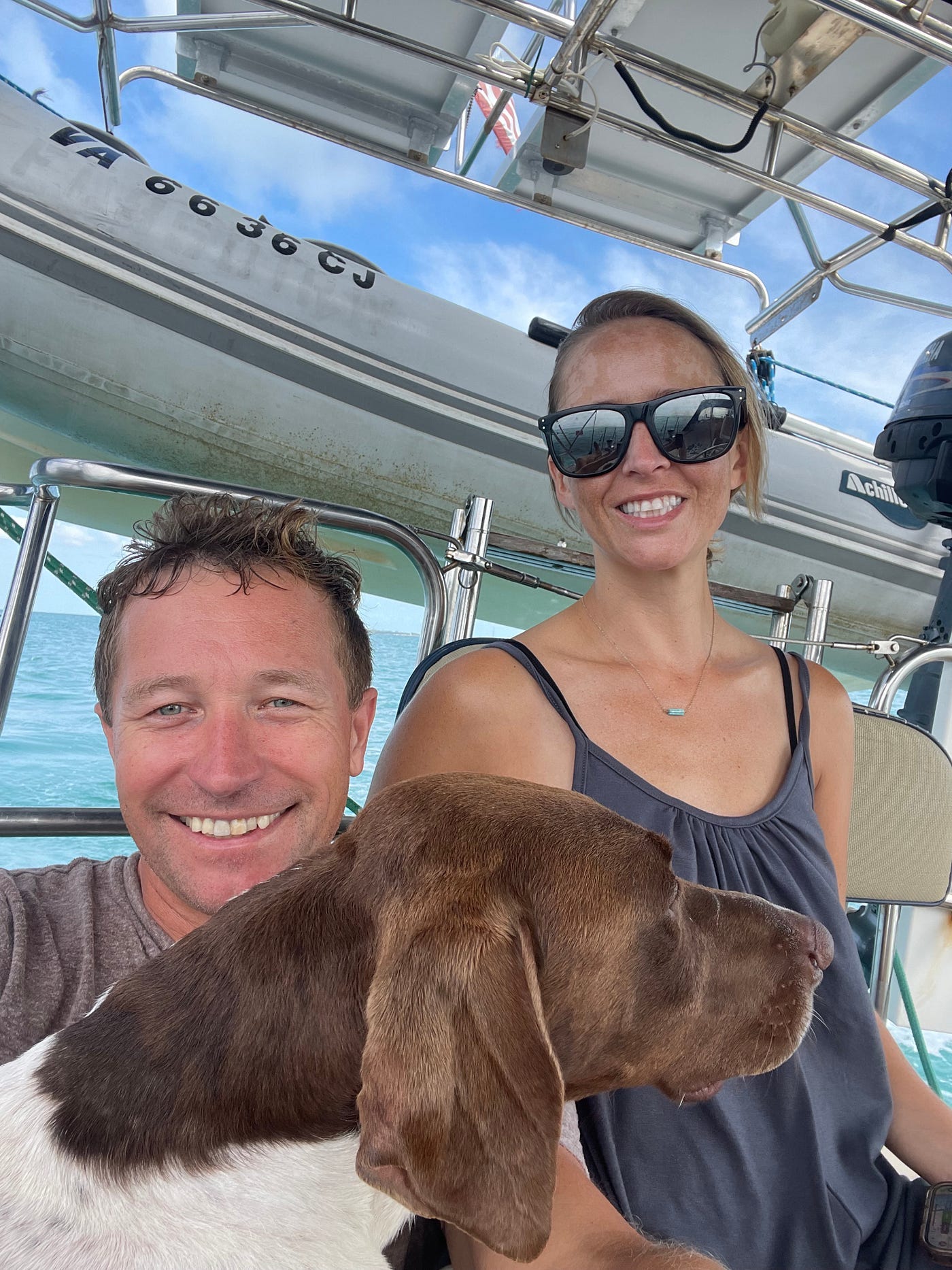We sailed between Sambo reefs a few miles off Key West, then turned southeast into the Straits of Florida.
“Gulfstream,” I pointed Alex to the bank of towering cumulus clouds billowing beyond the horizon. They marked the boundary of the current. We aimed to sail into Gulfstream and ride it north to Beaufort, North Carolina, on our way to Maine.
“How far are we?”
“Hard to say. Fifteen to twenty miles to the boundary. But we’ll go deeper where the current runs faster. Three to four hours?”
She scanned the heavy cloud bank ahead, running West to East. “Are we sailing into thunderstorms?”
“I hope not. No storms now. But the clouds can build.”
The weather forecast predicted a low chance of storms, but that’s for the islands. Gulfstream, the massive ocean river, makes its own weather, spawns its own thunderstorms, bends the prevailing winds, and fights the ocean swell with its own waves. It will serve surprises.
The towering clouds stirred unease, adding to my usual apprehension before long journeys. On ocean passages, many things must go right, and a few may go wrong. Will we lose our mast? Will the storms rip our sails? Will the autopilot fail a hundred miles offshore? During our preparation, we calm those worries with inspections and repairs, but they leave a residue that accretes into a heavy blanket of indefinite unease. It casts doubt on the plans, weighs on me. I incant — we are ready— to soothe the heavy feeling. No use. The reason crumbles before the worried mind; only the ocean miles can blow this blanket behind me. I will soon feel at ease.
Alex replaced me at the helm.
“I was sailing 145 degrees heading,” I pointed at the charts.
“Should we turn more east?”
“Maybe. Ten degrees towards Miami?”
Alex adjusted the autopilot, read out the wind and boat speeds. We were moving at six knots, almost seven miles an hour.
She settled in the captain’s chair. I cranked a winch two turns to trim the sails: the main and the genoa up front. The telltales aligned with the wind. I stretched out on a cushion next to the helm. This will be our routine for the next three days: one watching the charts, the sail trim, and the sea, the other relaxing or choosing podcasts to play on the speakers. During the day we will keep informal watch, at night we will switch every four hours, with one of us going below to sleep in bed.
We sailed in silence. The boat rolled on the gentle swell, from port to starboard, starboard to port, dropped into the troughs, and then climbed to the tops. The swell is always there. Distant winds form the rolling waves, and they glide across the ocean, swaying boats to the rhythm of the sea, even on the calmest days. They ease the mind, pitch thoughts to the sublime, and erase the sense of time. Hours passed in comfortable silence.
“Nine knots!” Alex pointed to our ground speed on the chart plotter. I sat up. The wind speed and direction had not changed. We gained a three-knot push from the current. “The extra speed knocked off a day off the trip.”
I leaned over the railing. The water changed color from the light azure of the coastal shallows to the deepest blue, almost purple. It is a sign of Gulfstream. The current roughly follows the continental shelf, where the bottom falls into an abyss from hundreds to thousands of feet. The depth colors the water. Two thousand feet. I shivered.
“Take the helm?” Alex asked. I nodded. She dashed below, came up from the cabin with two tumblers, wallowed through the cockpit, timing the rolling swells, and handed me a Dark & Stormy.
“Five o’clock and to our journey North!” She cheered. “How long to Maine, do you say, Captain?”
“Twelve sailing days,” I said. “Six weeks with stops unless we decide to hang in some places for longer.”
“Daunting.”
“Always feels so at the start, doesn’t it? Then it’s suddenly over; six weeks pass in a day.”
Alex nodded. She leaned against the transom and stretched her legs. I did the same. The sun was behind us, still hot.
The low-lying Florida Keys receded below the horizon, and soon, so did the sun. We chatted, played word games, and watched a movie on a laptop, occasionally checking the dark horizon for other ships’ navigation lights. But the horizon stayed dark; only us out here. At ten o’clock, Alex went to sleep below. I stayed at the helm for the first watch of the night.
I turned the navigation screens to the dimmest night setting and let my eyes adjust to the dark. A faint glow of Miami appeared ahead and to the North, only a hint of the city still 40 miles away, but in a few hours, its glow will overwhelm the sky. Darkness to the south.
We were between two worlds. Cuba lay sixty miles to starboard. US thirty miles to port. A short distance between but philosophies apart. The communist Cuba limped along, people hovering between poverty and hope. I grew up in a place like that, in the Soviet Union, that was no more, and so for the better. My old country exported the communist philosophy of lies and dictatorship over thought, exported revolutions that promised classless equality but delivered party aristocracy and the class of the poor. In that world, “all animals were equal, some animals more equal than others,” in Orwell’s apt observation. I looked to where Cuba lay and beamed my apologies.
My home was to port. I lived in the United States for thirty years. For the first five, I searched for my place in that foreign world. Semester by semester, I absorbed the culture, the language of optimism, learned the new landscape of possibilities where the future was not prescribed but in my power to affect. It became my home, and I came to love it. I am not blind to what must be better. I see problems and the country’s own cruelties. Yet, with my Soviet childhood, it is easy to keep the perspective — the US is the place to be, trust me.
Lightening lit up a cumulus tower drifting away from Cuba, the storm retreating to the east. Lightening behind us, too. All silent strikes, the distance suppressing the thunder. Clouds all around, but stars above shining through a small hole in the heavens. A glimpse of the moon. Sixty-seven percent illumination — I guessed. It is a game I play with Alex; the person closest to the correct number wins the bragging rights for the night. Will check when she awakes. We are fifty-fifty, but I claim I am ahead.
I leaned back, looked straight up, and lost touch with time.
A faint sound of the alarm brought me back to the ocean, the phone below waking Alex for her watch. Was it not an hour away still? I set up to check the chart plotter. We made eight miles since I last looked. Did I fall asleep? Well, there is nothing out here. We were still on course. Gulfstream still pushed us at three extra knots. I stood up to stretch and felt the warm, moist wind. I smelled only the ocean, no plants or earth, just clean salty air. The clouds and the lightning traveled further East, the faint silent flashes alighting peaks at the edge of perception. No lights on the southern horizon, Cuba in the dark. But to port, a glow of Miami crept higher above the horizon.
I tugged my safety harness — still attached to the boat, then walked to the transom and looked down at the waves. Wow!
The companionway slid open, and Alex climbed over the boards. She told the dog to stay below.
“How are you feeling?” she asked. “Want anything?”
“Don’t look at the screens for a bit. Get used to the dark. You must see this.”
“I can see, I had the lights off below.”
I waved her over. She clipped herself to the boat and then joined me.
The trails of bioluminescent plankton radiated behind us. Faint lines, ignited by the wake, shifted and morphed, slaves to the dynamic physics of waves. An occasional jellyfish lit up and drifted, then passed its energy to the next, touching off a chain reaction, a string of Christmas lights lighting and extinguishing in mere seconds, too brief and dim to leave a lasting impression on the retina but burning themselves into the memory of the night.
We sat and chatted about progress and plans, upcoming shipping lanes, and thunderstorms.
I stretched out on the cockpit cushion, intending to sleep upstairs. “Hey, Alex. Don’t turn to starboard for long. Can’t end up in Cuba. Not enough luck left to escape the communists twice.” I closed my eyes, and the swell rocked me to sleep.
“Egor! Egor!” Alex tugged my foot.
“What?” I jerked up. “Problem?” Nothing looked amiss.
“The wind is shifty. And the lightning is close.”
“Ahh. What is the wind doing?”
“It has been shifting by ninety degrees and dropping in speed.”
And then the wind died. The boat glided through the thick darkness, rolling more without the stabilizing pressure of wind in the sails. The sails began to flap.
“We should start the engine..”
Alex turned on the key. The engine quietly rumbled. She stood up at the helm, said our heading. We were turning a bit.
I felt a puff from the opposite direction of the earlier wind, then a confident blow, then a sound of coming rain or wind or both, but a roar after the quiet calm of the last two minutes. We could not see a thing; the world ended twenty feet outside the boat, consumed by night.
The wind hit with force. It came from the direction of the first puff and backwinded our genoa, pressing it against the rigging and heeling the boat. The boat slowed during the earlier calm and had little steerage. It could not resist the force of the squall and spun downwind.
“Alex, more power to the engine and turn us into the wind. I must get the head sail down.”
The sheets of rain slammed my face, heavy, cold, frigid, painful. Was it hail? No, rain. I grabbed the furling line to roll in the genoa, pulled on it, two heavy pulls, the line moved then would go no further.
“Alex, need to get the boat into the wind. I can’t get the sail in.”
“I am trying.”
The engine vibrated with more power. The boat fought the wind and the waves, whipped up by the squall. The waves slammed against the beam with loud slaps, the wind screamed through the rigging, heeling us further. Slowly, the boat turned to face the wind. The Genoa began to flap. I pulled on the furling line, but it would not budge.
“Damn it. I can’t roll in the sail. Something stuck.” I cursed the equipment, tried again, swore at the furler up front. I did not want to go to the bow in this shit.
“The jib sheet is still on the winch,” Alex yelled.
What a dumb mistake! The jib sheet pulls the sail out, and when locked on the winch, it stops the furler from rolling the sail in. You always have to release the jib sheet first. Well, I was still sleepy.
Alex released the jib sheet off the winch and slowly fed it out as I rolled in the genoa. We fell off the wind to fill the main sail with enough wind to keep it from flapping.
The squall whipped up the square waves. They crossed the swell and exploded with foam at intersections. The wind scooped the foam and tossed it into our faces. For an instant, the salty taste of the sea replaced the sweetness of rainwater, and then the rain pummeled the salt off our lips.
After a quarter hour, the wind slowed, and the rain relented to a heavy drizzle. The satellite was still on, so I checked the weather app on my phone. The squall line was racing away.
“Rain for another twenty minutes or so,” I said, “but then it should be good. The main thunderstorm went to the south; we just brushed the edge.”
The rain stopped in half an hour, and the wind slowly rotated behind us. The square waves smoothed. Only the swell now rolled the boat. We reset the sails and shut off the engine.
“Was not too bad. Often scarier when you imagine something than how it turns out to be.” I said.
“It was exciting enough.”
“We did good,” I said.
“We did,” she nodded. “Are you going back to sleep?”
“If you are fine. You still have two hours on your watch.”
She gave me a thumbs up, and I stretched out on the cushion.
Through my half-closed, heavy eyes, I watched Alex. Such luck to find a partner you can trust, someone who is confident in their power to tame fears and worries and sail the middle of Gulfstream in the night, to live with you through moments like this at sea, and to bond in the midst of a struggle.
The sea wields power to bring people together in weeks in a way that takes years on land. It peels the veneer of personas we construct to fit how the world says we should be or how we wish to be and cuts to who we are. Stripped of this worldly residue, two people bond the strongest.


